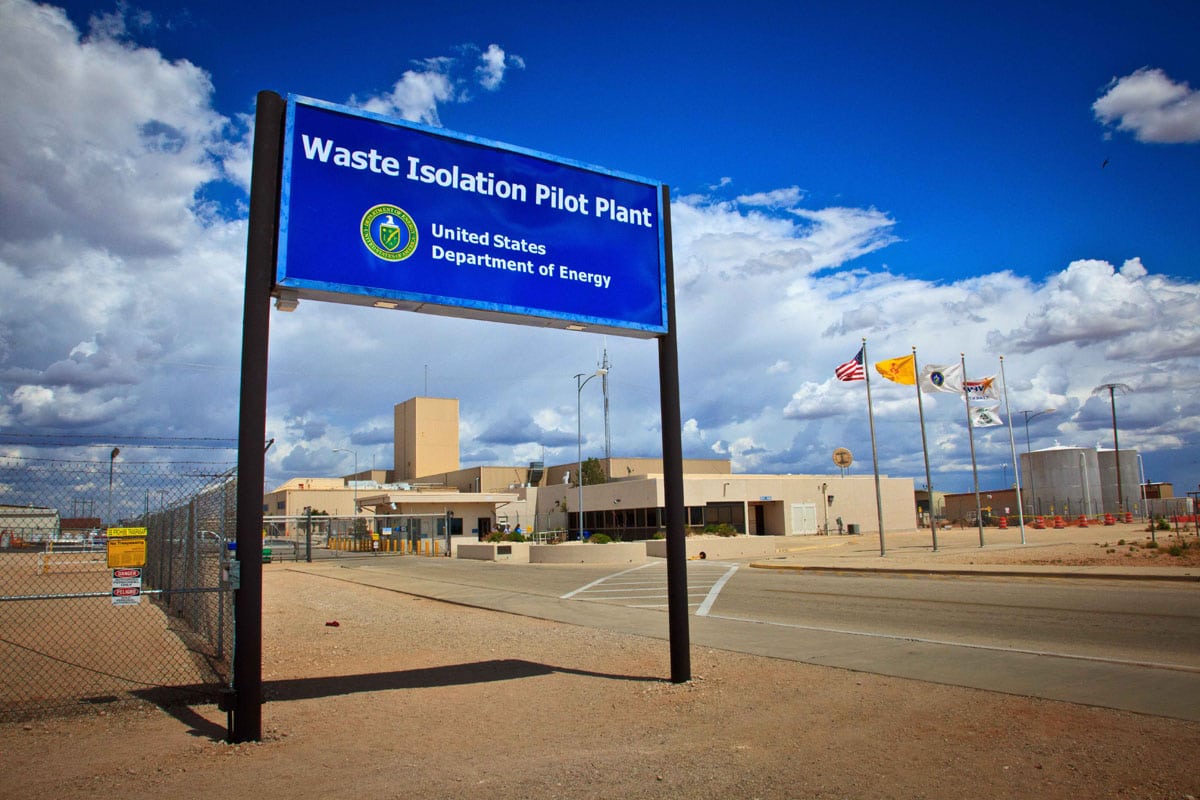
The Waste Isolation Pilot Plant is only 42% full and will be needed well beyond 2034 when a New Mexico permit renewal expires, the Department of Energy said in a regulatory filing this week.
DOE’s Carlsbad Field Office and its prime subcontractor for the Waste Isolation Pilot Plant (WIPP) also want a New Mexico Environment Department public hearing on the draft 10-year permit renewal for the underground disposal site for transuranic waste.
Carlsbad’s acting field office manager Mark Bollinger and Ken Harrawood, project manager for Bechtel’s Salado Isolation Mining Contractors, formally requested the hearing as part of a 27-page package of comments dated Tuesday. The comment period ended Wednesday.
While the tone of the DOE filing is less strongly-worded than comments days earlier by some communities around DOE sites, the federal agency refused to set a hard closure date for the disposal site. DOE also opposes most efforts spelled out by the New Mexico regulator in the draft permit to give the state more clout to suspend operations or force closure.
“The permittees appreciate that final waste disposal is not readily tied to a specific end date,” DOE said. But as of this month, WIPP is only at 42% of its congressionally-approved capacity of 6.2 million cubic feet or 175,564 cubic meters of waste. Ultimately closure will be affected by various factors at WIPP and DOE’s waste-generator sites, DOE said.
The Mayor of Carlsbad, N.M. Nuclear Task Force in comments also cited by the Energy Communities Alliance, which advocates for local governments near DOE facilities, said the New Mexico Environment Department is going overboard on proposed restrictions to the WIPP state permit.
Comments filed by DOE, the Energy Communities Alliance, citizen groups and individuals can be found on the state regulator’s WIPP comment website. At least one advocacy group, the Southwest Research and Information Center, also requested a hearing in its Wednesday comments.
The Idaho Departmental Quality in its comments said a “premature” closing of WIPP could complicate its ability to carry out terms of a 1995 legal agreement with DOE and the Navy that requires transuranic waste to be removed from Idaho.
While DOE wants to keep WIPP open into the 2080s, NMED prefers a firmer closure date some time before then. The state also wants more authority to suspend waste disposal and a commitment that DOE will look for a second transuranic waste disposal site, and that the second site be outside of New Mexico.
But the Carlsbad Task Force said such a move would need Congressional approval. DOE instead proposes “to voluntarily provide an annual update to New Mexico officials outside of the permit, regarding progress towards siting another geologic repository.”
The task force and the Energy Communities Alliance oppose most major changes sought by NMED.
The state’s proposal that it be able to halt WIPP operations “based on any allegation of noncompliance,” the Energy Communities Alliance called “chest thumping.” The alliance said “WIPP critics have routinely alleged non-compliance (unsubstantiated) since the day the permit was issued over 20 years ago. Is NMED now prepared to revoke the permit based on mere allegation?”
DOE says the state should only be allowed to shut things down with evidence of “imminent and substantial endangerment” to human health or environment.
As the only operating deep geological repository in the United States, “WIPP is the single most important site for all communities that are part of the nation’s defense environmental cleanup mission,” the alliance said in its written comments. The comments were signed by Brent Gerry, the mayor of West Richland, Wash., a neighbor to the Hanford Site.
“Without WIPP, frontline communities hosting federal cleanup sites may become de facto storage sites for the TRU [transuranic] waste created during the Cold War, as well as waste created at Los Alamos National Laboratory and Savannah River Site from preparation of surplus plutonium for disposal and fabrication of plutonium pits,” the Energy Communities Alliance said.
While DOE agrees that Los Alamos shipments should be a “priority,” delaying shipments from other sites while waiting on Los Alamos is both unnecessary and problematic, the federal agency said. In addition, DOE favors semi-annual rather than quarterly town-hall style public meetings for WIPP. The site used to hold quarterly sessions but managers concluded there is not enough new information to talk about every 90 days.
William (Ike) White, the acting head of the nuclear cleanup office, has said the feds will work collaboratively with New Mexico over state concerns. Similar remarks were made Tuesday by Betsy Forinash, acting deputy manager of DOE’s Carlsbad Field Office during a presentation to the National Academies Nuclear and Radiation Studies Board.
Editor’s note: Paragraph four and six corrected on April 25.